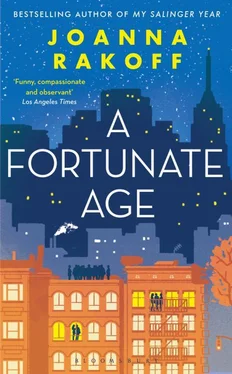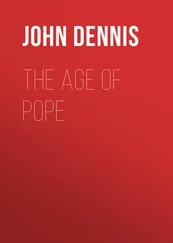“Emily, I mean, come on. Why does anyone quit drinking?” She pursed her lips together so as not to ask him to please stop using that ridiculous phrase.
“I don’t know anyone who’s ‘quit drinking,’” she told him primly.
“Sure, you do,” Curtis said. “Clara.” Emily recoiled at the mention of her sister’s name.
“ Clara stopped drinking,” she told him, feeling that now-familiar switch click on, unleashing an electric jolt of anger; there was something strangely exciting, even sexy about it, that odd, off-kilter feeling that anything, anything , might fly out of her mouth, “because she’s crazy . You’re nothing like Clara. Are you”—she was on the verge of screaming, the muscles in her arms strangely taut, her temple pounding—“are you saying that you’re an alcoholic ? Is that what you’re saying? Because you’re not . You don’t know anything about it, Curtis. You’re not an alcoholic.”
“I could be,” he said, his eyes still on the magazine. “And I am like Clara in some ways. I have a problem with addiction. I smoke. I drink too much coffee.”
Emily threw up her small hands. “Curtis, this is crazy! My sister has serious problems. It’s offensive to say that you, your, I don’t know”—her voice sputtered—“the fact that you smoke, like, a pack of American Spirit Lights every two days is in some way the same as my sister being an unreformed junkie who can’t function in normal society.” She was screaming now, her voice ragged, and Curtis had put down the magazine and dropped his head into his hands. His legs were so long that his knees poked up in sharp angles from the low couch.
“Please calm down,” he said, in such a quiet, heartbreaking way that Emily burst into tears.
“This is Amy, isn’t it?” she said. “This has something to do with Amy.”
“No, no,” he told her. He’d been thinking, a lot, he said—with the album coming out and the tour and all that—and realized that everything he and Emily did together involved drinking. They never sat and talked without a glass of wine in their hands. “You just have one, but I always want another. I get a taste for it.” And he thought, just as an experiment, that he’d stop and see how things progressed without alcohol as a “lubricant.” Amy , she thought. That sounds like Amy . And sure enough, when pressed, Curtis confessed that Amy had planted the idea in his head: she’d been insisting, lately, that Curtis’s drinking had driven them apart. And she was concerned, sweet girl, that it would do the same to him and Emily. Alcohol was a depressant and Curtis had depressive tendencies anyway, she said. He should really think about Prozac or Zoloft or something.
“Curtis, that’s just stupid,” Emily said. “You don’t need to be on antidepressants.” But she was remembering that in college he’d gone through an amphetamine phase (“It helped me focus”) and an LSD phase (“It helped me write”), and she was counting the number of his lyrics that had something to do with one drug or another. Or self-loathing. Or suicide. Okay , Emily thought, maybe I’ll give her this one .
“According to Pfizer, we all need to be on antidepressants,” he said, smiling, but she would not, no, she would not , let all this go with a laugh.
“Oh,” she said, folding her arms against her chest. “Well. Then. Why don’t we hook up the IV right now.” Curtis shrugged again, maddeningly, then let the real bomb drop: Amy had decided that they shouldn’t divorce until Curtis “sobered up.” Not, he insisted, because she didn’t want the divorce—she did , he said—but for Curtis’s own welfare. She didn’t want him to go through with the divorce in some sort of alcohol-induced fog only to regret it later.
“Why would you regret it?” asked Emily. “And why does it matter? If she wants the divorce, too, then why should she care if you regret it.” Curtis sighed and gave her a look of great tolerance, as though Amy’s logic was flawless and Emily a dolt for not understanding, but he would be kind enough to explain it one more time.
“She wants us both to be in the same place.” This was not Curtis-speak either, this “same place” talk. “Emily, listen, I don’t know why I’m defending her. This is crazy. I’m making you miserable with all this. I want to be with you—you’re my girl.” He grinned and shot her an embarrassed look. “I don’t want to be with Amy. I, I don’t even want to talk about Amy.” He moved his long hands around, formlessly, helplessly. “All this stuff with the band,” he said, his voice growing smaller. “I’m nervous.”
“But isn’t that normal?” Emily asked angrily. Suddenly, as though a camera inside her were shuffling its lens around, bringing everything into sharp focus, she understood what bothered her, what made her anxious about the way Curtis engaged with the world: he viewed every feeling, every fear, as aberrant, as necessitating a cure. Is this what came of having psychiatrists for parents? Or was this what he meant when he said he had an “addictive personality”: that he was always seeking to soften the edges of his emotions.
“Curtis,” she began. If she didn’t force herself to talk, she was, she was sure, going to start screaming. “You don’t have to do something just because she wants you to—” And then she stopped herself. Another thing she’d sworn: no negative words about Amy. They would only make Emily look bad and Amy wronged. Somehow, she saw, she and Amy had shifted positions. When she’d met Curtis, Amy had been the villain—she had cheated on Curtis; she had belittled him and abused him—and Emily his savior. Now, somehow, Emily had become the evil temptress who had seduced Curtis away from his wife . How had this happened?
“She’s just asking me to do this one thing,” he said firmly. “And it’s something I’ve been thinking about doing anyway. It’s the truth.”
Emily nodded. “Okay,” she said. “No drinking. For how long? Did she give you a time?”
“Three months.”
“Okay. Three months.”
All summer Curtis avoided drink, seemingly without any trouble. The guys had long stopped bringing beer to rehearsals anyway, now that they had a proper practice space in a nice, finished loft building a few blocks down on Bedford. She stopped drinking, too—at least when she was with him—and was delighted when she found that she’d lost a few pounds without even trying: the simple caloric difference between having a glass of wine with dinner each night and not. Each evening he went to a meeting at a church on North Eighth Street—two blocks from Emily’s apartment and she’d never taken note of it—and conferred with his sponsor, a thirty-year-old legal proofreader, whom he hated at first, then grew to like. “If we hadn’t met through AA, I bet we would have become friends anyway,” he told Emily. The sponsor was alarmed to hear that Curtis was about to start (or restart, as the case was) divorce proceedings. Apparently, you weren’t supposed to make major life changes when you were in “recovery.”
“It’s not a ‘major life change,’” Sadie cried when Emily explained this to her, over a much-needed glass of wine at Black Betty, back in May. “He and Amy haven’t lived together for two years. Getting back together with her would be a ‘major life change.’”
“I know,” said Emily. “I know.”
She came home from such outings with friends, hoping she didn’t smell like a bar, to find Curtis sitting on the couch tensely reading a paperback, resentful, it seemed to her, that she was not required—or willing—to participate in his experiment with abstention. But the nights she stayed in were no more comfortable: he arrived at her place reeking of smoke, his large, round eyes lowered with shame. What, she wondered, had he been talking about at the meeting? “How was it?” she’d asked the first night. But he’d just shrugged and flung himself down on the couch. “We’re not supposed to talk about it,” he mumbled, hours later, into her hair. “The meeting. It’s private.” “Okay,” Emily said, and thereafter tried, brightly, to talk around the subject, chatting about her day at the office or her friends, or silently crawling on top of him and burying her head in his neck, until the discomfort abated and he became her Curtis again. Still, she realized, she now had a fourth Curtis to contend with: the Curtis who went to meetings at a dingy, Italianate church and talked to strangers about deeply personal things—things he wouldn’t (okay, couldn’t ) tell her. Three private selves was, she thought, verging on too many.
Читать дальше












